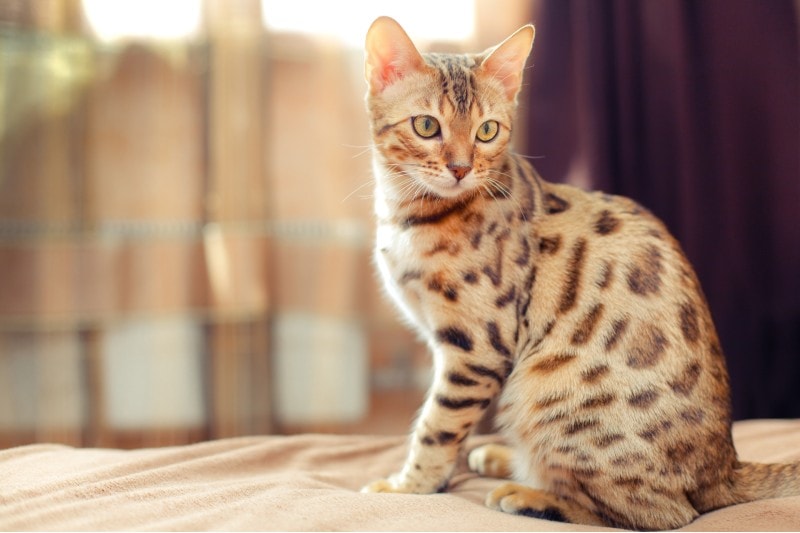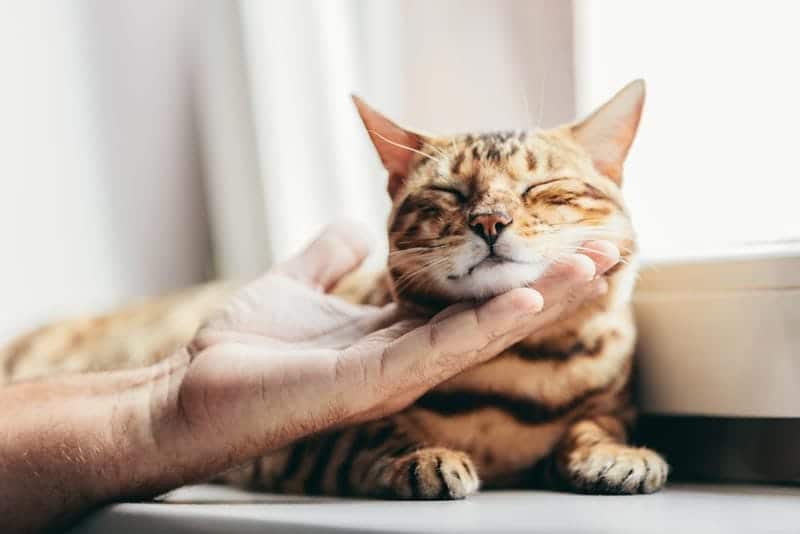Bengal cats usually purr just as much as other cats. However, they often purr very loudly; some will be more vocal than others, and the breed is known for being very communicative. Bengal cats are expressive and often use purring and other sounds like chirrups, meows, and chirps to let their owners know exactly how they’re feeling. Bengal cats are also known to be very affectionate as a breed, which means they may very well purr a lot more in the presence of their owners than they do on their own.
Siamese cats also share these talkative traits, and it’s thought that intelligence also plays a role in how much your Bengal will purr or meow. Much like all cats, Bengals will purr when they are particularly happy. They’ll purr if they’re being scratched in the right place and feel relaxed and content in their surroundings. However, there are specific reasons why your Bengal may be purring that aren’t quite as nice.

Why Do Bengal Cats Purr?

Cats will purr for various reasons, and the same is true for the Bengal. While they may purr more often than other cats (and purr more loudly), they usually purr for the same reasons. For example, Bengal cats can purr because they are happy, content, excited, or looking forward to something (usually food) or if they are stressed or in pain.
The cat’s purr is rather mysterious. It was first thought to have something to do with the blood and how it runs through the veins, but scientists have recently discovered that cats use their diaphragms and larynx (voice box) to pull air through and create the deep, rumbling purr we associate with happiness.
This purr continues when the cat breathes in and out in one continuous noise, and because we’re still studying feline communication, we know only a few things about why cats purr. It’s thought that cats purr as a reaction. For example, if you scratch your Bengal on their back or stroke along the top of their head, they might purr to let you know they like what you’re doing and to keep doing it!
If they’re happy and contented, the Bengal will purr quite often. It’s a good sign and is not loud, but it can be louder if interspersed with happy little trills and chirps. They’ll often rub up against their people, purring, chattering, and generally communicating happily with them, which means they can be pretty noisy. The Bengal cat breed originated from Egyptian Maus, a short-haired breed hailing from Egypt and known for their musical and chortling voices.
But observations have been made of cats, including Bengals, that are very sick or even dying who purr to themselves with no one else around them. This is thought to be a self-soothing or pain-relieving response, as a cat’s purr can promote bone and tissue healing. Cats purr at a range between 20Hz to 100Hz, which has been proven to be the exact range of sound thought to be beneficial to healing.
Bengals are often thought of as creatures of emotion that will let you know how they feel. Cats are known to purr when anxious, so this may be another reason Bengals will purr more often than other cat breeds, as they tend to suffer separation anxiety if left alone for long periods.
Final Thoughts
Your Bengal may purr more than other cats as they’re known for being talkative and are always happy to convey their thoughts and feelings to their owners. Bengals usually purr loudly as their voices must be heard! But this will usually be interspersed with chirrups and chirps, meows, or little head bumps to let you know how they feel and check that you’re listening to them.
Featured Image Credit: PHOTOCREO Michal Bednarek, Shutterstock










